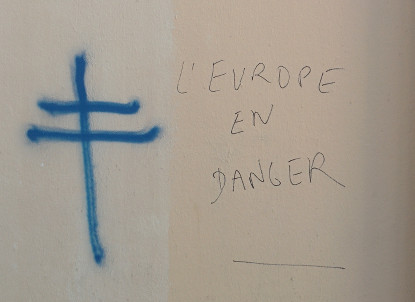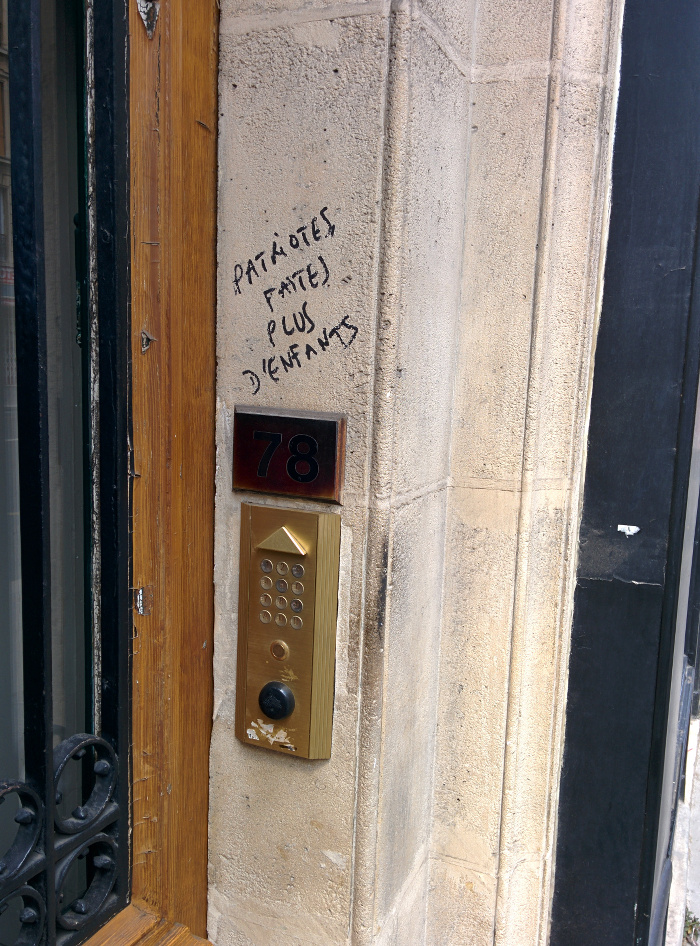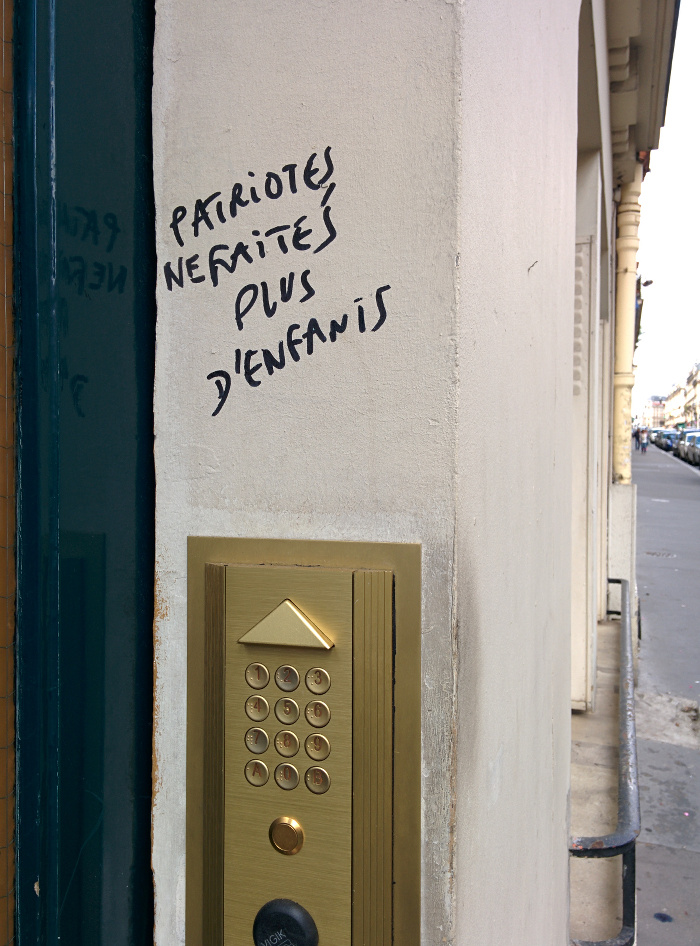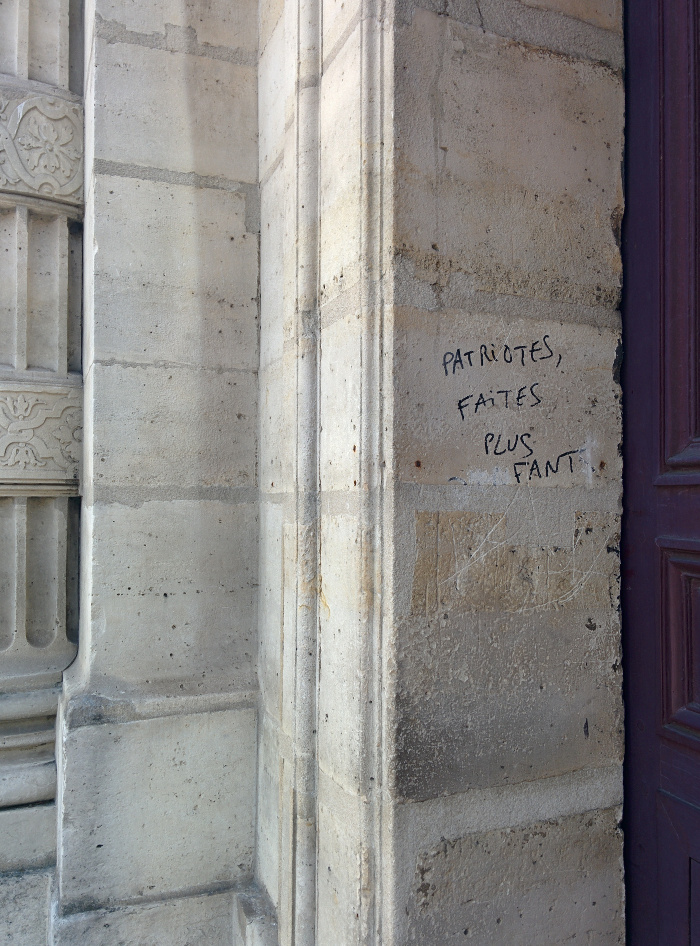Patriotes, faites plus quoi?
« previous post | next post »
 In the neighborhood where I'm staying in Paris, one of the most common graffiti is a blue croix de Lorraine, sometimes with associated text. The cross is of course a religious and nationalistic symbol, and the text is generally interpretable as anti-immigrant. (Click on the image to see a larger version, with more context.)
In the neighborhood where I'm staying in Paris, one of the most common graffiti is a blue croix de Lorraine, sometimes with associated text. The cross is of course a religious and nationalistic symbol, and the text is generally interpretable as anti-immigrant. (Click on the image to see a larger version, with more context.)
And next to many doorways, someone with similar handwriting has scrawled an apparently related exhortation: "Patriotes, faites plus d'enfants" ("Patriots, make more children"):
I've been here for more than six weeks now, and these graffiti seem to be static — I don't think any new ones have appeared, but none of the old ones have been painted over or sandblasted or whatever.
However, there are some editorial additions and subtractions that also seem to have become part of the stable local landscape. The commonest one is a simple negation:
One that puzzles me is on the entrance to the right-hand doorway in the facade of Saint-Étienne-du-Mont, just across from the Panthéon:
This is the entrance that is generally open. And someone has scraped off the initial "D'E" and the final "S", so that those entering the church — at least the "patriots" — are now exhorted to "FAITES PLUS FANT".
I have a feeling this must be wordplay of some kind — why else stop after removing just those letters? But no interpretation comes to mind. Suggestions?



Lily said,
June 12, 2015 @ 11:58 am
fantome?
Judith Strauser said,
June 12, 2015 @ 12:29 pm
A friend tells me that fant is a Haitian creole word for "crack, gap, lacuna", and wonders if it's a contrived joke about making drugs (crack) – but since that would require a first-step translation into English for the Haitian creole world, it seems really contrived. On the other hand, could it be that "faire fant" means something like disappear, vanish (into a gap/lacuna) – maybe it's saying "French people, disappear more" ? Which is sort of a diametrical opposition to the original "faites plus d'enfants" injunction. That kind of seems contrived too, but hmm.
Mark Meckes said,
June 12, 2015 @ 1:21 pm
According to the French language Wiktionary, "fant" appears in several vulgar phrases derived from Occitan, which are all glossed as "expletive capable of expressing all sorts of strong emotions" ("juron pouvant exprimer toute sorte de vives émotions"). Interestingly, it appears that "fant" is just a shortening of Occitan "enfant".
Mark Meckes said,
June 12, 2015 @ 1:24 pm
Now that I look more closely, Wiktionary doesn't say these phrases derive from Occitan. Instead, they seem to be regional French phrases from Occitania (i.e., southern France), and "fant" is in fact just a shortening of French "enfant". But evidently that shortened version is associated with vulgarisms.
K. Chang said,
June 12, 2015 @ 1:33 pm
Which reminds me to ask the language experts from around the world.
What does the French use for "honk" (American) or "hoot" (British) (as in car horn)?
Yes, I'm looking for onomatopoeia of… the car horn.
In Cantonese I'd say something like "boot" but it may be HK/SF variant of Cantonese. EX: lei dim gai mm boot kui? Why didn't you honk (at) him?
And I'm surprised I can't seem to locate the same term in Mandarin. My brain kept going to "press the horn (button)" 按喇叭 but that's not quite the same. :)
My Spanish also came up blank, as I never had to drive and speak Spanish so apparently I never had to learn the term car horn in Spanish. :D
Wordnerd said,
June 12, 2015 @ 1:42 pm
Could it be a (quasi-)homophone? Perhaps "fane" (wilt)?
Bonnie said,
June 12, 2015 @ 2:17 pm
Based on Judith's comment above (that "fant" = "crack, gap, lacuna"), the easiest reading would seem to be "Patriots, make more SPACE", i.e. accommodate and welcome the immigrants coming into your country.
Nathan said,
June 12, 2015 @ 2:51 pm
@K. Chang: In Spanish one normally says bocinazo, but that's not an onomatopoeia.
Lisa said,
June 12, 2015 @ 3:36 pm
I'm a native francophone (from Quebec though, not France), and I can't make anything of the last one.
The one where the negation is added is clever and more obvious play on de word "plus", which is at the same time the word used for addition (patriots, make more children) as well as the negation (patriots, do not make children anymore), and that the negative particulate "ne" is not mandatory in familiar speech.
@K. Chang: I would say "pout-pout" /putput/ in French, even if I would also use "meep-meep" or "honk-honk", influenced by English, I suppose.
Justin said,
June 12, 2015 @ 4:01 pm
As far as I know there's no onomatopoeic synonym in French for klaxoner (to honk).
The sound is usually described by some variation on "tut tut".
K. Chang said,
June 12, 2015 @ 4:13 pm
@Nathan — so the "honk" would be "tocar la bocina" (touch the horn)… similar to Chinese.
Hmmm… Any one knows what's it in German? :D
Kim said,
June 12, 2015 @ 4:26 pm
I've been living in France for many years, and can't make anything out of it, other than someone getting a kick out of partially erasing it.
@K. Chang: the verb in French is "klaxonner", and the noun is a "klaxon". Not onomatopoeia.
Roger Lustig said,
June 12, 2015 @ 4:41 pm
@K. Chang: To honk the horn is "hupen." I've heard various onomatopoeiae, from "Tut" (long u) to "Ta-ti-ta-ta" (the post-coach horn, still used on some Swiss buses).
David Bird said,
June 12, 2015 @ 5:21 pm
Patriotes, faites plus de fente.
marie-lucie said,
June 12, 2015 @ 6:54 pm
Long-term French expatriate: my data may be old-fashioned:
"car horn" ; le klaxon ('x' =[ks])
"(from car) to honk" : klaxonner
"sound of car horn" : pouète pouète (monosyllables)
Johannes said,
June 12, 2015 @ 8:00 pm
Naturally this is something of a long shot, but what if one took 'plus fant' (pronouncing the final s) as the best attempt someone armed with just a scraper could make at rendering 'plus souvent'? From there one could easily posit the (necessarily) elliptical phrase, 'Patriotes, faites plus souvent [l'amour]'. Perhaps our counter-graffitist has a more romantic cast of mind than his predecessor.
Ran Ari-Gur said,
June 12, 2015 @ 8:01 pm
I agree with Lisa; changing « plus » to « ne … plus » is not just "simple negation", but actually a pun on two different senses of plus (and two different uses of de).
christoll said,
June 12, 2015 @ 8:22 pm
I just find it amusing that "faites plus d'enfants" can, as Lisa indicated above, already be interpreted as "don't have any more children" even without the addition of the "ne". French is a pretty funny language at times. I'm wondering how the griffiti could have been written to make the meaning unambiguous. You'd have to use a different verb, I think.
leoboiko said,
June 12, 2015 @ 8:24 pm
@K. Chang: Dunno about Spanish, but in Portuguese the onomatopoeias are "bi-bi" (/bi:bi:/) and "fom-fom" (/fõ:fõ:/), for the higher- and lower-pitched ones. They often appear together.
christoll said,
June 12, 2015 @ 8:30 pm
I guess you could always write "faites plus d'enfants" unambiguously by writing it phonetically: "faites [plys] d'enfants". But that is probably expecting rather too much of this particular graffiti artist.
D-AW said,
June 12, 2015 @ 10:25 pm
Maybe it's too obvious to have been mentioned, but the default onomatopoeia in English for sounding a "car horn" is not "honk" but "beep", at least everywhere I've been. My intuition (and google n-grams bears me out) is that as a noun and intransitive verb "beep" trounces "honk" [Geese (emit) honk(s); cars (emit) beep(s)], and while "honk" may have "beep" beat as the transitive verb these days, especially with alliterative "horn", there is still this from the 1936 OED2 first quot, by Ogden Nash: "Beep the horn and howl the klaxon For Hebrew, Latin and Anglo-Saxon; Howling klaxon, beeping horn."
Mark Meckes said,
June 13, 2015 @ 2:15 am
For French car horn onomatopoeia I've seen "bip bip", though it's not a verb.
Judith Strauser said,
June 13, 2015 @ 4:12 am
@K. Chang: Francophone native from France here – the onomatopoeia for a car/truck/motorbike and even a hand-held horn is indeed "pouet". You'll find it in French comics (bédés/BD).
Ern said,
June 13, 2015 @ 4:18 am
Patriotes, [ne] faites plus [de] FANaTiques
M. Jouitteau said,
June 13, 2015 @ 4:36 am
I am a native speaker and the first hypothesis that comes to mind is that someone has had to run away!
The graffiti remains now to be completed.
I propose "Patriotes, faites plus POUR FantA", the name of the three year old little girl that was held in prison five days alone this week for not having the right passport.
http://blogs.mediapart.fr/blog/resf/110615/comme-une-grande-fanta-3-ans-et-demi-et-5-jours-en-retention
K. Chang said,
June 13, 2015 @ 4:46 am
Merci, merci
So is English the only language that use onomatopoeia as a verb, thus far?
Matt_M said,
June 13, 2015 @ 9:35 am
@K. Chang:
There's a list of car horn onomatopoeia in various languages here:
https://en.wikipedia.org/wiki/Cross-linguistic_onomatopoeias#Car_horn_honking
Berna said,
June 13, 2015 @ 10:29 am
In Dutch the car horn is called a 'toeter', the verb is 'toeteren', and the sound it makes is 'toet' (pronounced 'toot').
Ran Ari-Gur said,
June 13, 2015 @ 4:41 pm
@Bonnie: But then they wouldn't have erased the « d' ». (In fact, if they'd been clever, they could even perhaps have changed the « d'enfants » to « de fant ».)
Jerry Friedman said,
June 13, 2015 @ 5:40 pm
D-AW: How did you get that ngram result for verbs? When I try it with "at", I always get results like this, with "honk" ahead but "beep" getting close or exceeding it for a while around the turn of the century.
Since my usage was formed before 1980, I use "honk" as the verb for car horns.
Rod Johnson said,
June 13, 2015 @ 6:22 pm
I would be careful about making broad claims about "defaults." For me, the default would definitely be "honk"; nowadays I reserve "beep" for the act of locking or unlocking a car with a remote key fob (viz., "did you remember to beep the car?").
Rod Johnson said,
June 13, 2015 @ 6:27 pm
(Oops, forgive me that misused "viz.")
Séverine said,
June 14, 2015 @ 1:58 am
I'm French, Parisian, and I don't get it. I second the comment that supposes someone had to run away.
D-AW said,
June 14, 2015 @ 6:49 am
@Jerry Friedman I'm trying to reproduce my n-grams result and I can't. Today I'm also getting graphs that look like yours, so I must have mixed up two charts. Originally I had four – pure onomatopoeia ("honk, honk"), nouned onomatopoeia ("the/a honk"), transitive and intransitive verbed noun. For the first two "beep" is dominant by far, with the switch over around 1960. For both kinds of verb, I now see, "beep" is only lately catching up. My apologies to all you honkers.
Incidentally, OED2 has first "honk" for a goose in Walden (1854), antedated in OED3 to Wilson's Ornithology in 1803. I wonder what they said before that.
John Swindle said,
June 14, 2015 @ 7:53 pm
Patriots! Honk if you're making babies!
Alexander said,
June 14, 2015 @ 10:55 pm
@K.Chang- No, not just English. It looks like both Dutch and German have verbs for honking that are ultimately onomatopoetic, namely toeter- and hup- (toot and hoop). Swedish, Norwegian and Danish also have a "toot"-derived verb. Question now would be whether any Germanic language doesn't have an onomatopoetic honk verb. OED has the English only going back 200 years, and relating originally to geese. I don't know about German hup-, or everybody else's toots.
E-Ping Rau said,
June 15, 2015 @ 4:15 am
@K. Chang: in Mandarin (at least in the Taiwan variety), the onomatopoeia for car horn is bā (叭), and most people (including me) simply use that as the verb as well: "nǐ gànmá bù bā tā? (你幹嘛不叭他)" ("Why don't you honk him?")
It's probably used in Taiwanese as well, but I'm not sure if that's a borrowing from the Mandarin-speaking population or if they arose independently. I wonder if confusion sometimes happens due to its use, though, since there's a native verb "pa" in Taiwanese (different orthography, same pronunciation) which means "to hit, to smack, to slap".
mollymooly said,
June 15, 2015 @ 9:10 am
I would estimate "honk" for US and "beep" > "toot" > "hoot" for UK. I've seens signs saying "Honk if you support X" on USTV; never seen one [with honk/beep/toot/hoot] in real life. Drivers do beep at times if they agree with a (non-imperative) placard slogan.
tetri_tolia said,
June 15, 2015 @ 4:25 pm
S.A. English always 'hoot'.
Lisa said,
June 15, 2015 @ 5:09 pm
@K Chang: You are right, in French, the onomatopeia for honk! is not used as a verb. However, I would not say that it is the case everywhere in French. But to respect te verb structure, we would add +er in the infinitive form, as +ing is add to honk to express the process of honking (?).
Brett said,
June 16, 2015 @ 1:02 am
In The Wind in the Willows, the sound of the car horn (which would have been a manually operated car horn) is "poot poot."
ajay said,
June 17, 2015 @ 8:43 am
It is not. It is "poop poop".